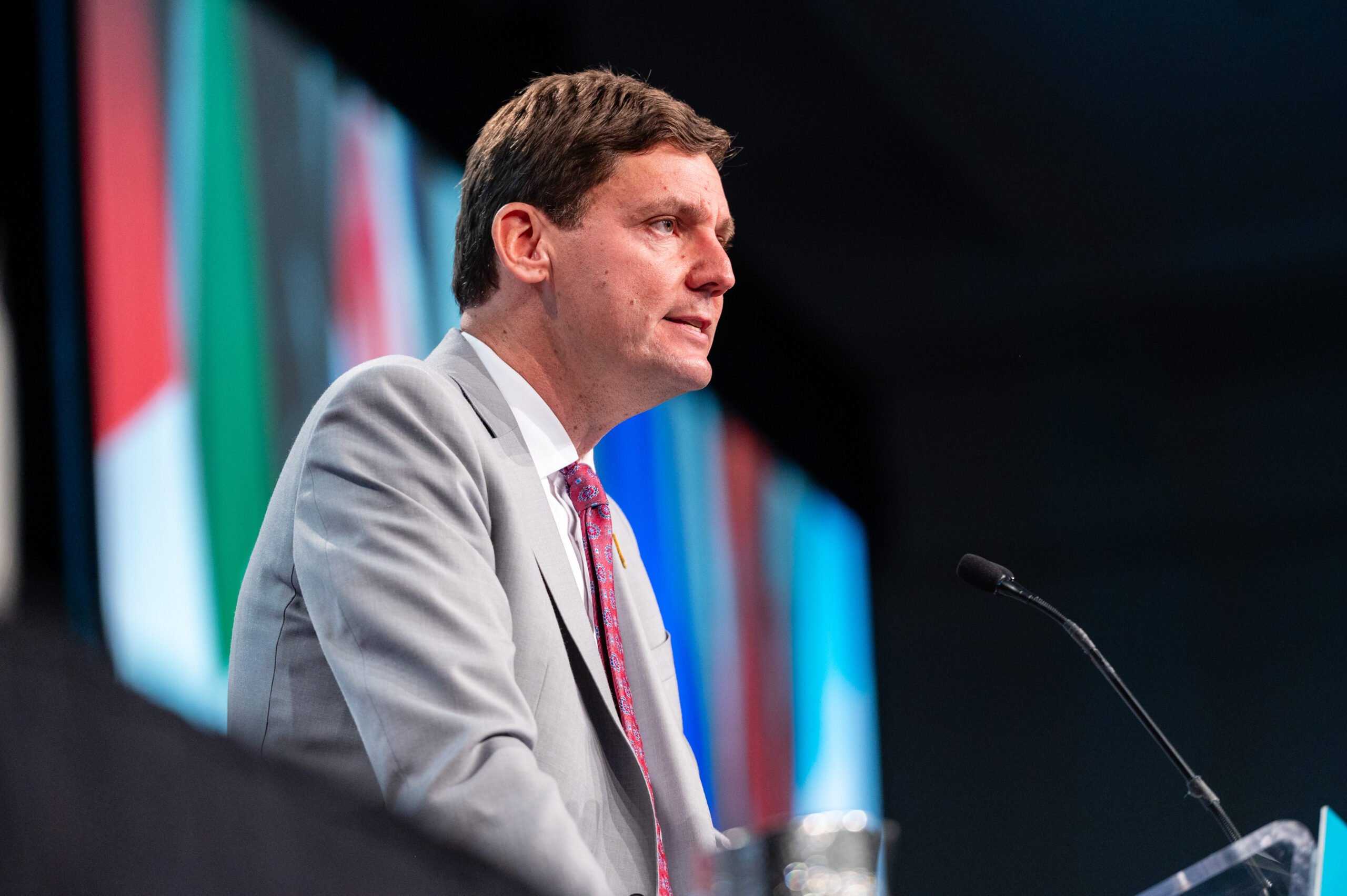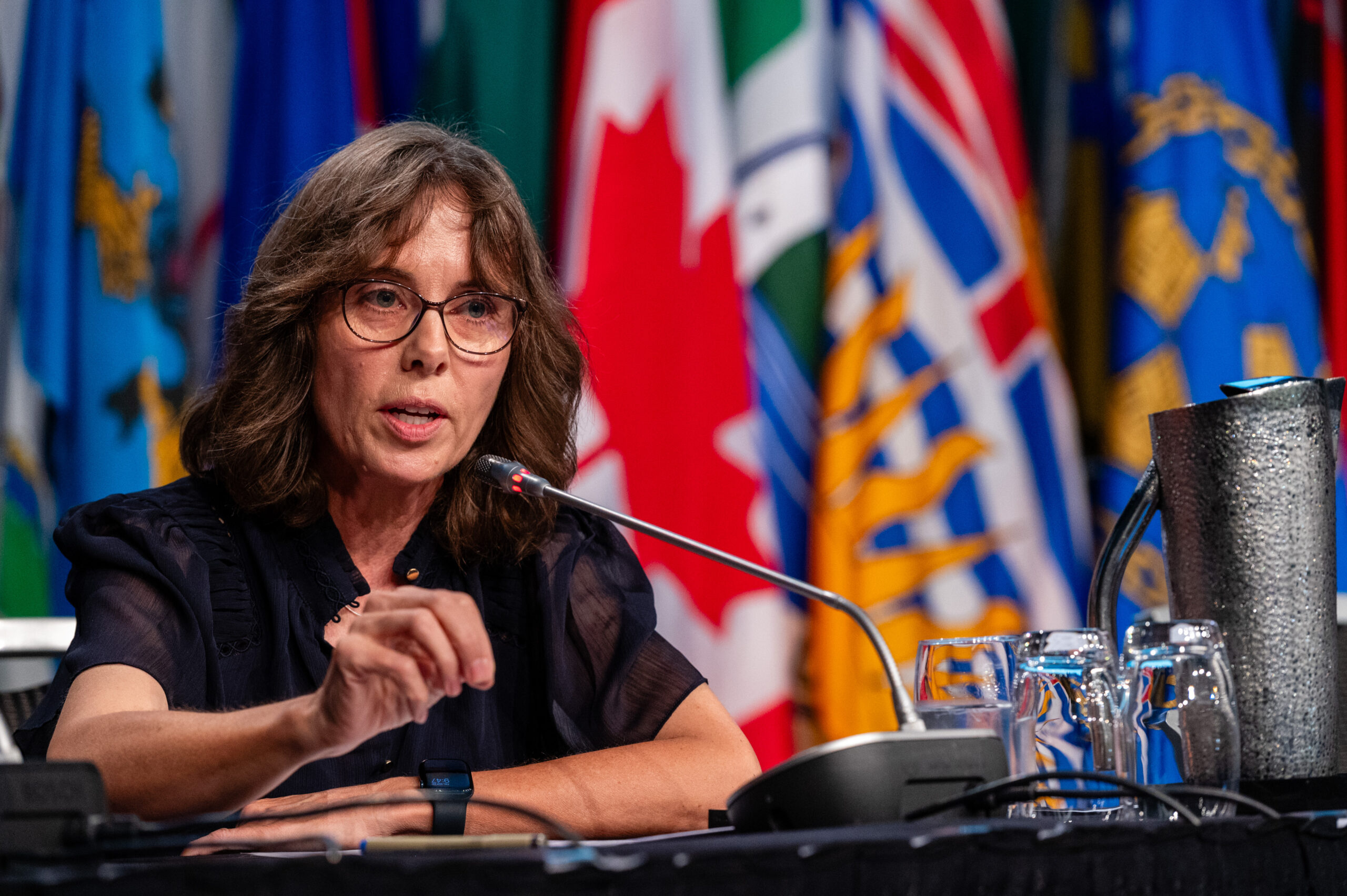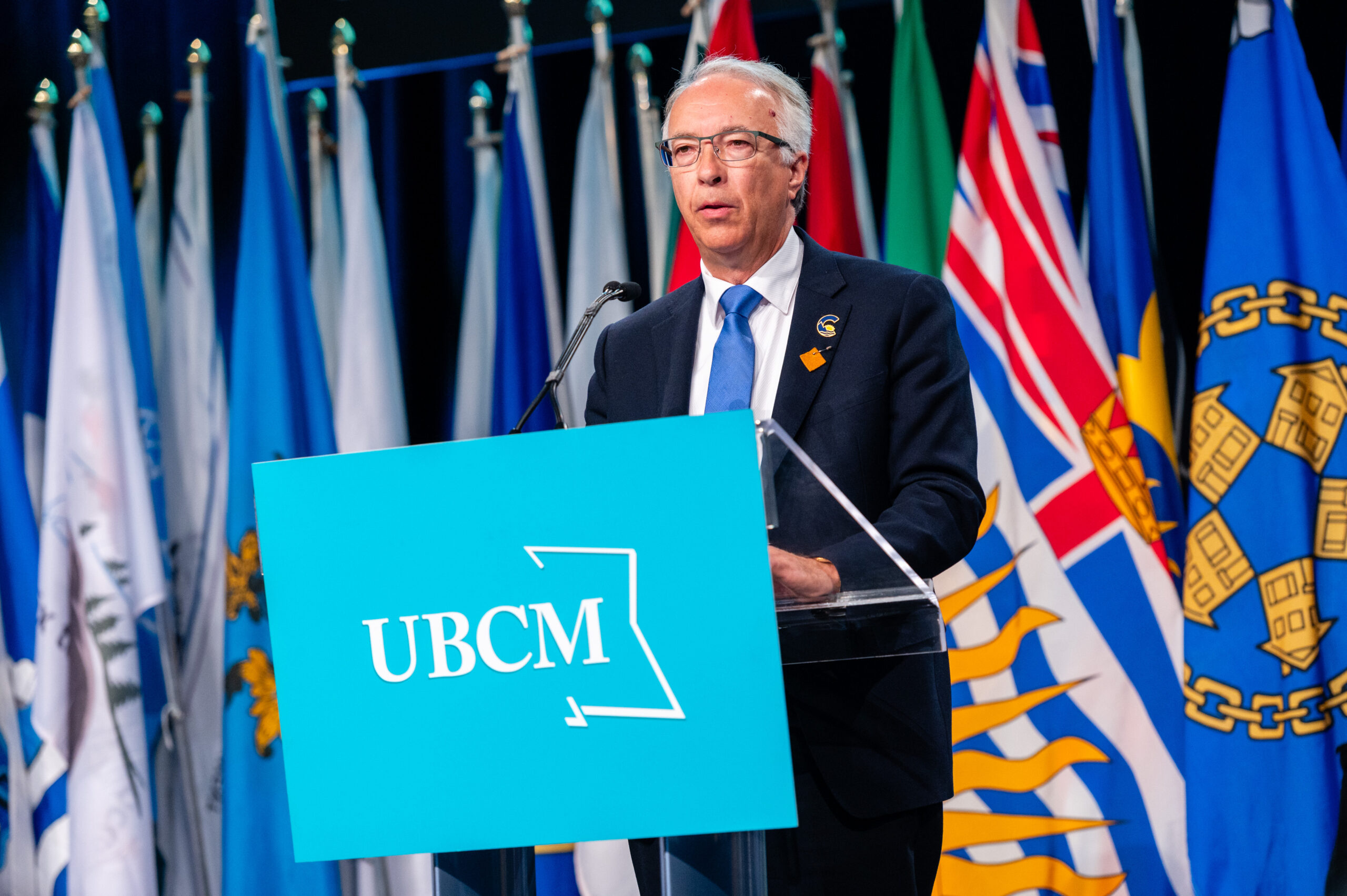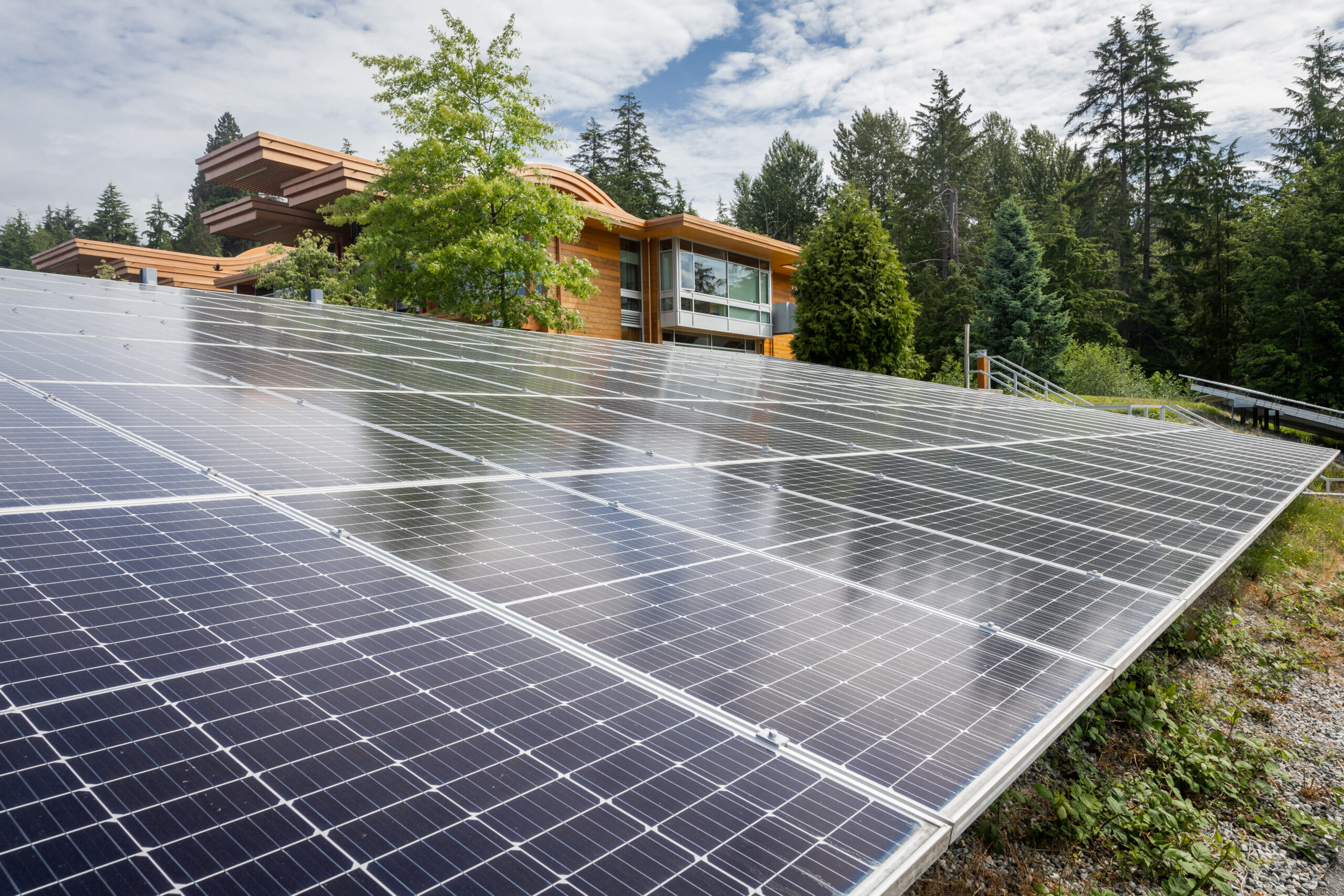
‘Afraid of the water’? Life in a city that dumps billions of litres of raw sewage into lakes and rivers
10 billion litres of sewage are dumped into Winnipeg’s lakes and rivers each year. Some...
Get the inside scoop on The Narwhal’s environment and climate reporting by signing up for our free newsletter.
As the trio of B.C. political party leaders arrived at CBC’s Vancouver offices last week for the only televised debate during the 2024 provincial election campaign, they were met by dozens of climate activists carrying red and white signs.
“Frack Free B.C. Protect our climate,” some banners read.
“Stop PRGT,” read another banner, referring to the Prince Rupert Gas Transmission pipeline that would carry natural gas from B.C.’s northeast to a proposed liquefied natural gas (LNG) export facility on the coast. “No new fracked gas pipeline.”
For much of the fall campaign, environment and climate action policies have taken a back seat to promises to address affordability, health care and public safety.
But as the conflict over the Prince Rupert pipeline heats up, with an on-going blockade on Gitanyow territory aimed at stopping the first phase of construction and a major government decision about the pipeline looming, the continued development of LNG in B.C. has stepped into the spotlight as a key environmental issue in the campaign.
When it comes to the future of energy in B.C., all three major political parties — the BC NDP, the BC Conservatives and the BC Greens — are pitching a vision that includes plentiful, cheap electricity with an emphasis on clean power sources. But their views and policies about how to achieve that vision — and what exactly clean power means — vary widely.
With television and radio leadership debates over, the party platforms (mostly) published and voting day fast approaching on Oct. 19, here’s what you need to know about where the parties stand on key energy issues.
As government, the BC NDP green-lighted an LNG export industry, claiming stringent emission standards will allow the province to reap economic benefits while still meeting its carbon emission reduction targets, a position critics say is impossible to achieve.
BC NDP Leader David Eby once agreed with those critics, stating B.C. could not “continue to expand fossil-fuel infrastructure and hit our climate goals” during his 2022 campaign to succeed former premier John Horgan. Shortly after becoming premier, Eby reversed his position on the future of LNG in B.C.

The NDP maintains natural gas will displace more carbon-intensive coal-fired electricity in countries on the other side of the Pacific Ocean, a view the BC Conservatives have also enthusiastically embraced.
“We see it as a way to try to transition the global emission profiles of heavy emitters in other parts of the world, to help them with their energy needs,” Peter Milobar, a former BC United MLA who is running for the Conservatives in Kamloops Centre, said during a recent online candidates debate hosted by Organizing for Change, a coalition of non-profit groups focusing on environmental issues.
The claim that LNG is a crucial transition fuel for the world is widely disputed by critics, who point out that countries like China, often cited for its reliance on coal for energy production, are outpacing most nations in developing renewable energy projects. The benefits of LNG are also disputed in a new peer-reviewed study, which found exported gas has a larger carbon footprint than coal.
The Prince Rupert Gas Transmission pipeline would ship natural gas from northeast B.C. to Ksi Lisims, a proposed floating liquefaction and export facility on the northwest coast — one of seven LNG projects proposed, approved or under construction in the province.
The new provincial government will have to make a major decision about the pipeline. It will consider work done on the pipeline until Nov. 25 in its decision about whether to lock in the project’s original environmental assessment certificate indefinitely — by granting what’s called a “substantially started” designation — or to require a new environmental assessment.
Only the Greens are promising to restrict LNG development in B.C., pledging to phase out fracking operations, reject new LNG projects and direct the environmental assessment office to let PRGT’s environmental assessment expire. Following the leaders’ television debate, the party won plaudits from actor Mark Ruffalo for its anti-LNG stance.
During the leaders’ debate, BC Greens Leader Sonia Furstenau highlighted the similarities between the NDP and Conservative positions on LNG.
“They’re aligned on subsidizing fossil fuels, they’re aligned on building more LNG infrastructure in B.C. They’re aligned on continuing to drag us back to a fossil fuel age when the rest of the world is moving forward,” Furstenau said.

“Under the NDP, we’ve gone from zero LNG facilities to a potential of seven. We have a government that is all in on a fuel that is now proven to be worse than coal, that the International Energy Agency has said will leave B.C. behind because the demand will be gone,” Furstenau added, referencing a 2021 analysis that the world can reach net-zero by 2050 without further investment in fossil fuel sources.
If the Conservatives form government, the party promises to double the province’s LNG production. B.C.-based LNG export production won’t begin until next year when LNG Canada plans to start shipping liquefied gas overseas. The LNG Canada facility, in Kitimat, B.C., will be capable of producing up to 14 million tonnes of LNG per year.
Under Eby’s leadership, the government approved Cedar LNG — a Haisla Nation-led liquefaction and export facility that will receive gas from Coastal GasLink. Additionally, the BC NDP government issued construction permits for Woodfibre LNG, a liquefaction project in Squamish, B.C., that is majority owned by Indonesian billionaire Sukanto Tanoto’s Pacific Energy Company. Combined, the two facilities will produce about five million tonnes per year once operational.
Four other LNG projects are undergoing environmental assessments, including the Ksi Lisims LNG project. If approved, they could produce another 30 million tonnes of LNG per year, mainly from fracked gas.
The NDP’s election platform only mentions LNG once, saying some of the revenue raised from LNG projects will be directed into a “clean economy transition fund” to help “attract even more global investment in renewable fuels, clean tech, manufacturing and critical mineral mines.”
Asked twice during an Oct. 9 press conference whether his party would approve more LNG projects if re-elected, Eby avoided a direct answer.
“LNG or any other project, it needs to fit within our commitments around carbon pollution and for our energy action framework that means a realistic plan to be net zero by 2030, lifting up communities and creating opportunities for British Columbians,” Eby said in response to questions from The Narwhal.
The BC NDP’s energy action framework — unveiled the same day Eby announced his government’s approval of Cedar LNG — included a promise to implement a cap on emissions from the oil and gas sector in B.C. by 2026.
If there’s one policy area where all three parties are making similar promises, it’s electrification and the need for more energy generation.
The Conservatives are pledging to “seize the opportunity to make our province a leader in clean, affordable and reliable energy” — including repealing B.C.’s ban on nuclear power generation. The NDP would make B.C. a “clean energy superpower,” while the Greens are calling for investments to “expand renewable energy while protecting our natural environment and our communities.”

Voters will need to read between the lines to understand some stark differences in what the parties are offering.
A Conservative government would consider “all power sources that could keep B.C.’s energy mix independent, low cost and green,” including nuclear, hydrogen, wind, solar and hydroelectricity. Electricity demand in the province is expected to double by 2050 — with the LNG industry consuming vast amounts of electricity — and the Conservatives claim the NDP has “no plan” to meet the increased demand.
The Conservatives have also promised to increase local power production in northwest B.C. by promoting the use of waste wood products sourced from local forestry operations and natural gas. Rustad described the northern transmission line — a project still in the planning stage that would extend a new transmission line across northern B.C. to help electrify industrial operations in the northwest — as “another boondoggle project” backed by the NDP, which wants federal taxpayers to pay half the $3-billion price tag.
If the transmission line isn’t built, it’s unlikely that future LNG projects will have access to the clean electricity needed to meet the current emission-intensity limits implemented by the NDP (although Rustad has promised to do away with those as well).
Neither of the Conservatives’ two power-related policy announcements mention climate action.

The NDP platform promises to double the province’s electricity generation by 2050 and upgrade transmission capacity to address demand. It took a step toward that when, in January, BC Hydro issued a call for clean and renewable energy project proposals, aiming to boost electricity generation by 3,000 gigawatt hours — enough to power about 270,000 homes or one million electric vehicles — per year by 2028. The invitation resulted in 21 proposals that could produce more than 9,000 gigawatt hours per year. Seventy per cent were wind projects. BC Hydro plans to issue subsequent calls for proposals every two years.
Eby also announced a big funding boost to BC Hydro’s 10-year capital plan to upgrade and expand power transmission capacity across the province.
The Greens’ platform also emphasizes local power generation — but only from renewable sources — along with improving energy storage capacity and energy efficiency policies. Solar power would get a boost, with $20 million dedicated to small-scale solar projects, with the goal of solar producing 15 per cent of the province’s energy by 2035.
The party would also invest in exploring the potential of geothermal power in B.C., including whether it would be feasible to repurpose technology currently being used in the oil and gas industry to produce geothermal energy. A $20-million investment would help train the skilled workforce needed to support the renewable energy sector, including offering retraining to people currently working in the oil and gas sector, according to the Greens.
For the past six years, the guiding light of B.C.’s climate policy has been the Clean BC plan, rolled out by the NDP government in 2018 in partnership with the Green caucus at the time.
Clean BC includes legislated targets to reduce B.C.’s greenhouse gas emissions by 40 per cent below 2007 levels by 2030. By 2050, B.C.’s goal is to cut emissions by 80 per cent through policies aimed at boosting the use of electric vehicles and reducing emissions from industry, buildings and transportation.
However, as Milobar, with the BC Conservatives, pointed out, B.C. is lagging on its emission reduction goals.
“We are five years away from 2030 and nowhere near that 40 per cent,” he said during the on-line environmental issues candidates’ debate. “I think it’s time, frankly, that we acknowledge we’re not going to hit that goalpost. It does not mean that we don’t still try to reduce emissions in British Columbia and also do our part globally, but to say that we are going to somehow magically go from essentially a higher [emissions] profile than we had in 2007 in the next five years, and find a 40 per cent reduction is simply not honest with people in British Columbia.”
BC Conservatives Leader John Rustad has said the party would eliminate Clean BC if elected, framing it as a costly reaction to an overblown issue.
“Our changing climate is not the most pressing issue facing us in B.C. or around the world,” a BC Conservatives statement read. “The Conservative Party of BC will not go down the rabbit hole of over-taxation, hype, scare tactics and false promises.”
During a leaders’ debate hosted by the Greater Vancouver Board of Trade on Oct. 2, Rustad said he would look at axing Clean BC to reduce government spending and avoid spending cuts to public services as the Conservatives attempt to reduce B.C.’s growing deficit.

While Clean BC barely features in the NDP platform, the party is promising to pursue policies aimed at reducing emissions, including the forthcoming emissions cap for the oil and gas industry, bulk-buying heat pumps and electrifying B.C. school buses.
The Green platform mentions carbon emissions 32 times — compared to nine references in the NDP platform — and the party is promising to develop a new climate action plan to cut down on emissions. The Greens would also ban the use of natural gas in all new buildings. The Conservatives would “reverse the NDP’s radical plans to ban natural gas heating,” although that’s not an accurate description of the former government’s proposal.
The NDP government did conduct a consultation on a proposal to introduce new energy efficiency standards for home and water heating appliances earlier this year. If implemented, the proposal would ban the sale of stand-alone heating systems that use oil or gas but allow dual fuel systems, including gas heating systems integrated with a heat pump.
Another NDP policy a Conservative government would axe is the Zero Emission Vehicles Act. Passed in 2019 and amended last year, the law would ban the sale of new internal combustion engine light-duty vehicles — meaning cars, trucks, vans and SUVs but not heavier transport vehicles — by 2035, in line with federal targets. The law covers fully electric vehicles as well as plug-in hybrids.
By the end of this year, zero-emission vehicles (ZEVs) are expected to account for 16 per cent of new vehicle registrations in Canada. In B.C. — home to nearly one-quarter of zero emission vehicles — more than 21 per cent of new vehicles registered in the first half of 2024 were considered to be zero emission.

The popularity of zero-emission vehicles in B.C. is partly due to provincial rebates for both personal and commercial vehicles, as well as investments in charging infrastructure.
The NDP is promising to double the number of public electric vehicle chargers in B.C. by 2030. The Greens would also expand public charging infrastructure, offer incentives to people who want to convert their gas or diesel-powered vehicles to electric and set sales targets for medium and heavy-duty electric vehicles, similar to those currently in place.
The Conservatives have called the NDP’s plan to ban the sale of new internal combustion vehicles “radical” and are promising to repeal the Zero Emission Vehicle Act if the party wins the election.
Get the inside scoop on The Narwhal’s environment and climate reporting by signing up for our free newsletter. On a warm September evening nearly 15...
Continue reading
10 billion litres of sewage are dumped into Winnipeg’s lakes and rivers each year. Some...

Court sides with Xatśūll First Nation, temporarily halting Mount Polley mine waste expansion

Break out the champagne: Emma’s storied life and leadership in journalism has earned her the...
